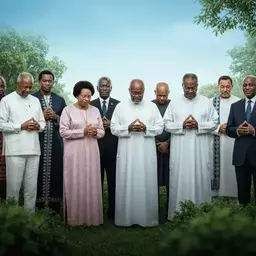Prayer Resources for Church Leaders
By Hannah M. Abara / Nov 22
As we navigate the complexities of leadership, one powerful tool often goes underutilized: prayer. By embracing prayer, leaders can seek divine guidance, cultivate integrity, and foster community transformation. Are you ready to explore how prayer can enhance your leadership journey?
This visual illustrates the diverse approaches to prayer among leaders in different cultural contexts, highlighting the varying emphasis on communal, individual, and traditional practices. To delve deeper into how various cultures approach collective spiritual practices, read about the impact of communal prayers on community development.
Communal prayers involving the community in decision-making processes.
Individualistic prayer often focusing on personal guidance.
Prayers deeply rooted in tradition and spirituality guiding leaders.
Daily prayers that guide decisions and policies.
Situational prayers often used during crises or pivotal moments.
An emphasis on community prayers that involve collective wisdom.
In today’s fast-paced world, the power of prayer holds incredible significance, especially in leadership positions. In contexts like Africa, America, and Israel, the act of praying is not just a personal ritual; it serves as a transformative tool that shapes the decision-making processes of leaders. When we pray, we invite divine guidance, which can lead to impactful governance and inspire integrity in leadership.
As I reflect on my journey with the Presidential Prayer Watch, I am constantly reminded of how prayer can uplift leaders, helping them navigate complex challenges. Have you ever considered how your prayers could influence decisions made across these regions? It's profound to think about!
Across different cultures, the role of prayer in leadership varies but remains fundamentally important. For instance, in many African communities, prayer is often a communal experience, where leaders gather with their constituents to seek direction and wisdom. In contrast, American leaders may incorporate prayer more individually or in smaller groups, allowing for a personal connection with their faith. You can find more insights on this topic by exploring profiles of inspiring leaders in prayer.
These diverse practices illustrate how prayer can be a uniting force or a personal refuge. By understanding these differences, we can better appreciate the transformative power of prayer in leadership across cultures.
Spiritual renewal is a concept that resonates deeply with leaders who seek to maintain their integrity and wisdom. It refers to the process of rejuvenating one's spirit through reflection, prayer, and seeking divine guidance. Scripture teaches us that leaders are called to be the light for others, and spiritual renewal is essential for them to fulfill this role effectively.
Consider the words in Psalm 51:10: “Create in me a clean heart, O God, and renew a right spirit within me.” This verse captures the essence of what spiritual renewal entails—an inner transformation that equips leaders to serve better.
As we explore prayer practices worldwide, it is fascinating to see how these rituals impact leadership effectiveness. For example, in the Middle East, leaders often incorporate prayer into their daily routines, viewing it as a necessary component for wise decision-making. Meanwhile, Western leaders might engage in prayer more sporadically, often during critical moments.
Understanding these cultural nuances not only enriches our perspective on leadership but also highlights the significance of incorporating prayer into day-to-day life for leaders everywhere.
Throughout scripture, we find remarkable examples of leaders who understood the importance of prayer. Take Moses, for instance; he regularly sought God’s counsel before making decisions for the Israelites. His prayers were not just personal; they shaped the destiny of a nation.
Similarly, the apostles prayed fervently for guidance as they spread the message of Christ, demonstrating how prayer can empower leaders to fulfill their divine calling.
The Bible provides a treasure trove of teachings on prayer strategies relevant to today’s leaders. Whether it’s through persistent prayer, as seen in Luke 18:1-8, or the humble prayers of Nehemiah seeking rebuilding guidance, these lessons remind us of the essential role prayer plays in effective leadership. For more resources on this, consider how you can be praying for political leaders effectively.
Lastly, faith-based initiatives like the Presidential Prayer Watch illustrate how prayer can serve as a catalyst for social change. Through our collective prayers, we uplift not only our leaders but also the communities they serve, fostering a spirit of hope and empowerment. Have you seen how prayer can transform your community?
How do you incorporate prayer into your leadership style? Share your thoughts below:
Integrating prayer strategies into our daily lives can lead to profound spiritual renewal and significantly enhance our leadership qualities. When we embrace prayer, it becomes more than just a ritual; it transforms into a powerful tool for personal and collective growth. As we intercede for our leaders, we not only support their journeys but also foster our own spiritual depth.
At the Presidential Prayer Watch, I often remind myself that prayer is a bridge connecting us to divine wisdom. This connection empowers us to lead with integrity and resilience. By actively engaging in prayer, we cultivate a community where growth and renewal flourish!
Starting or enhancing your prayer life as a leader can feel daunting, but it doesn't have to be! Here are some practical steps to integrate into your daily routine:
By taking these intentional steps, we can foster a vibrant prayer life that enhances our leadership capabilities. Remember, each prayer is a step closer to spiritual renewal and effective leadership!
Being part of a supportive community can significantly enrich your prayer experience. I encourage you to engage with or even form a prayer group to walk this journey together. Here’s how being in community can help:
As we lift each other in prayer, we create a network of leaders committed to pursuing spiritual growth and integrity. Are you ready to be part of this transformational journey?
Participating in leadership retreats and workshops can be incredibly beneficial for enhancing your prayer life. These settings provide structured time and space for reflection and growth. Here’s what to expect:
These retreats are not just about learning; they're about transforming your prayer life and leadership skills. I believe that when we dedicate time to this process, we emerge renewed and equipped to face the challenges ahead!
As we conclude this exploration of prayer in leadership, let’s remember that prayer is the bedrock of spiritual renewal and effective leadership. Integrating these practices into our lives will not only transform us as individuals but also empower those we lead. Are you ready to take the next step? Together, let’s commit to a prayerful approach in our leadership journeys and witness the positive change it brings to our communities and beyond! If you're interested in connecting with global prayer initiatives, learn how you can join a global prayer for leaders.
Here is a quick recap of the important points discussed in the article:
Prayer in leadership is significant because it provides divine guidance, fosters integrity, and can lead to community transformation. It helps leaders navigate complex challenges and make impactful decisions.
Prayer practices vary across cultures. For example, in African contexts, prayers are often communal, involving the community in decision-making. American leaders may engage in more individualistic prayer, while Israeli leaders' prayers are deeply rooted in tradition. Middle Eastern practices often involve daily prayers guiding policies, and Western leaders might pray more situationally during crises.
Spiritual renewal for leaders is the process of rejuvenating one's spirit through reflection, prayer, and seeking divine guidance. It equips leaders with the inner transformation necessary to serve effectively and maintain integrity and wisdom.
Practical steps include setting specific times for prayer, incorporating scripture to guide prayers, starting with short sessions and gradually extending them, and reflecting on prayer experiences through journaling.
Joining a community of prayerful leaders offers accountability, shared insights from diverse experiences, collective strength through united prayer, and encouragement during challenging times, fostering resilience and hope.



 Prayer Resources for Church Leaders
In a world where decisions made by leaders can shape destinies, the power of prayer becomes a vital
Prayer Resources for Church Leaders
In a world where decisions made by leaders can shape destinies, the power of prayer becomes a vital
 Uplifting Stories of Global Prayer
Prayer is not just a personal journey; it’s a powerful movement that can unite communities and ins
Uplifting Stories of Global Prayer
Prayer is not just a personal journey; it’s a powerful movement that can unite communities and ins
 Contribute to Presidential Prayer Movements
What if a simple act of unity could change the course of leadership? The role of prayer in guiding n
Contribute to Presidential Prayer Movements
What if a simple act of unity could change the course of leadership? The role of prayer in guiding n